Advanced Solutions for 6G Satellite Systems

Workshop Overview
Numerous new applications including machine-to-machine communications, mobile broadband, virtual and augmented reality demonstrated the vast potential of fifth-generation (5G) wireless communications, and it is in full swing around the world. As satellites will play important roles and are new to the traditional terrestrial-based mobile systems, this workshop addresses the issues concerning the role of satellite systems as a complementary solution for ubiquitous 6G coverage. The emerging applications such as precision agriculture, health care, and autonomous cars dictate the research agenda of 6G and beyond to provide global connectivity and satisfy the UN’s Sustainable Development Goals (SDGs). The purpose of this workshop is to address the key innovations needed in different sectors (e.g., system architecture, network management, security, QoS/QoE and KPIs) to meet the expected challenges in performance for future 6G systems empowered with a satellite multi-layer system (also denoted as Non-Terrestrial Network, NTN). This workshop is completely virtual and organized by the Satellite working group within the IEEE Future Networks Initiative (https://futurenetworks.ieee.org/) and is aimed to discuss new ideas for the revised roadmap with the contributions of authors of main stakeholders in this field. This event will also be the opportunity to discuss novel ideas and to share the views with other participants via question/answer sessions at the end of each talk.
This workshop is organized in tracks as follows:
- Physical layer for 6G NTN networks
- Performance evaluation of QoS/QoE and KPI for 6G satellite networks
- Future satellite networks management
- Edge computing and intelligence for satellite 6G
Workshop Schedule
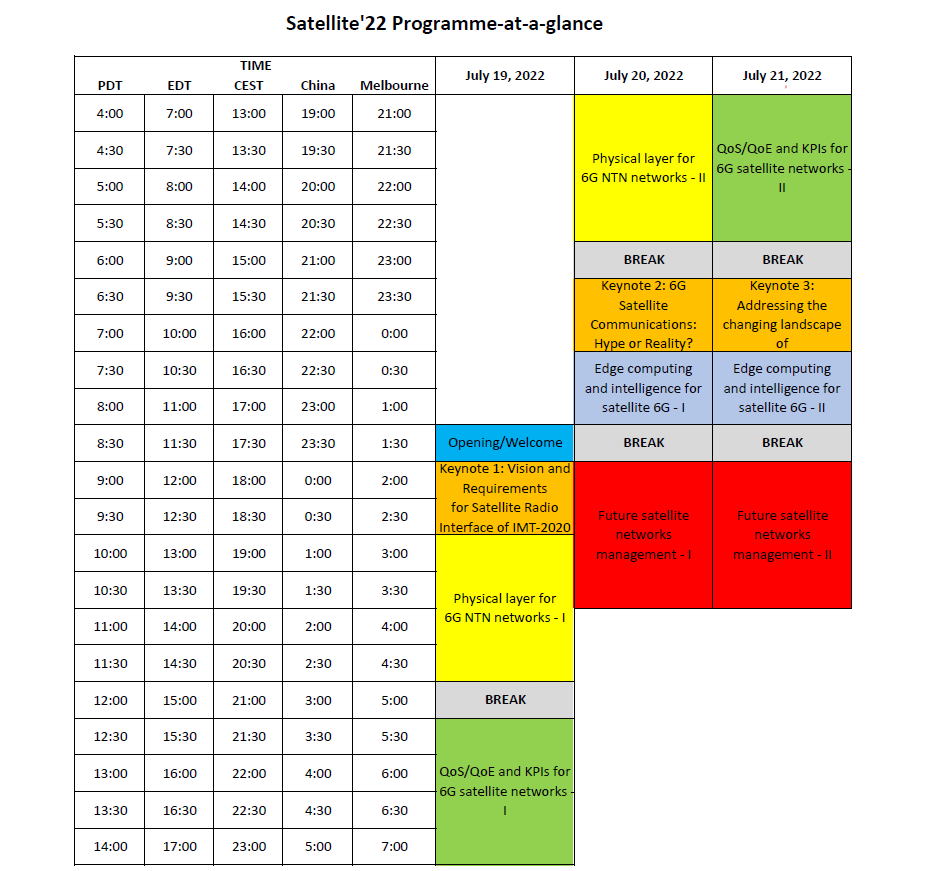 |
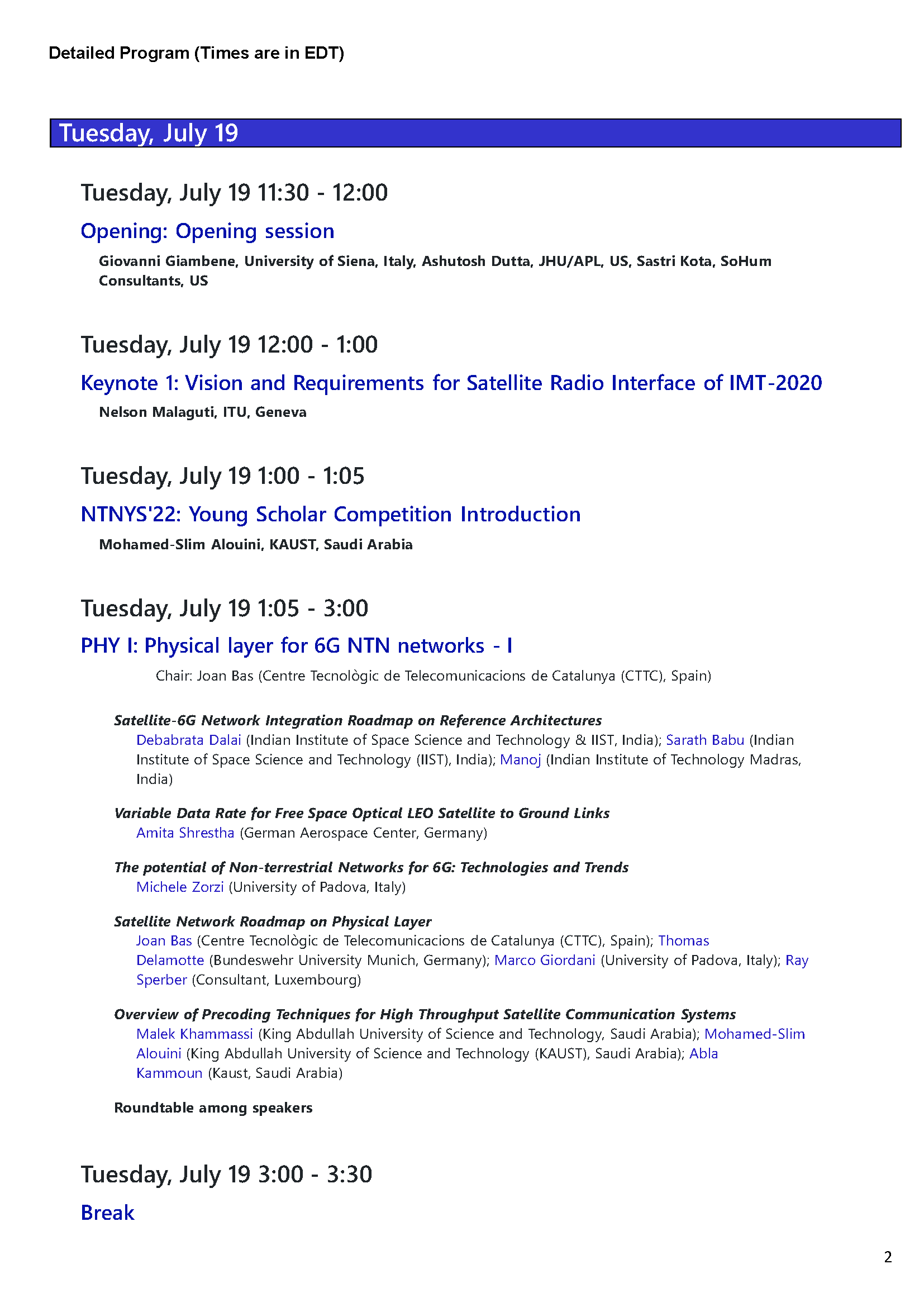 |
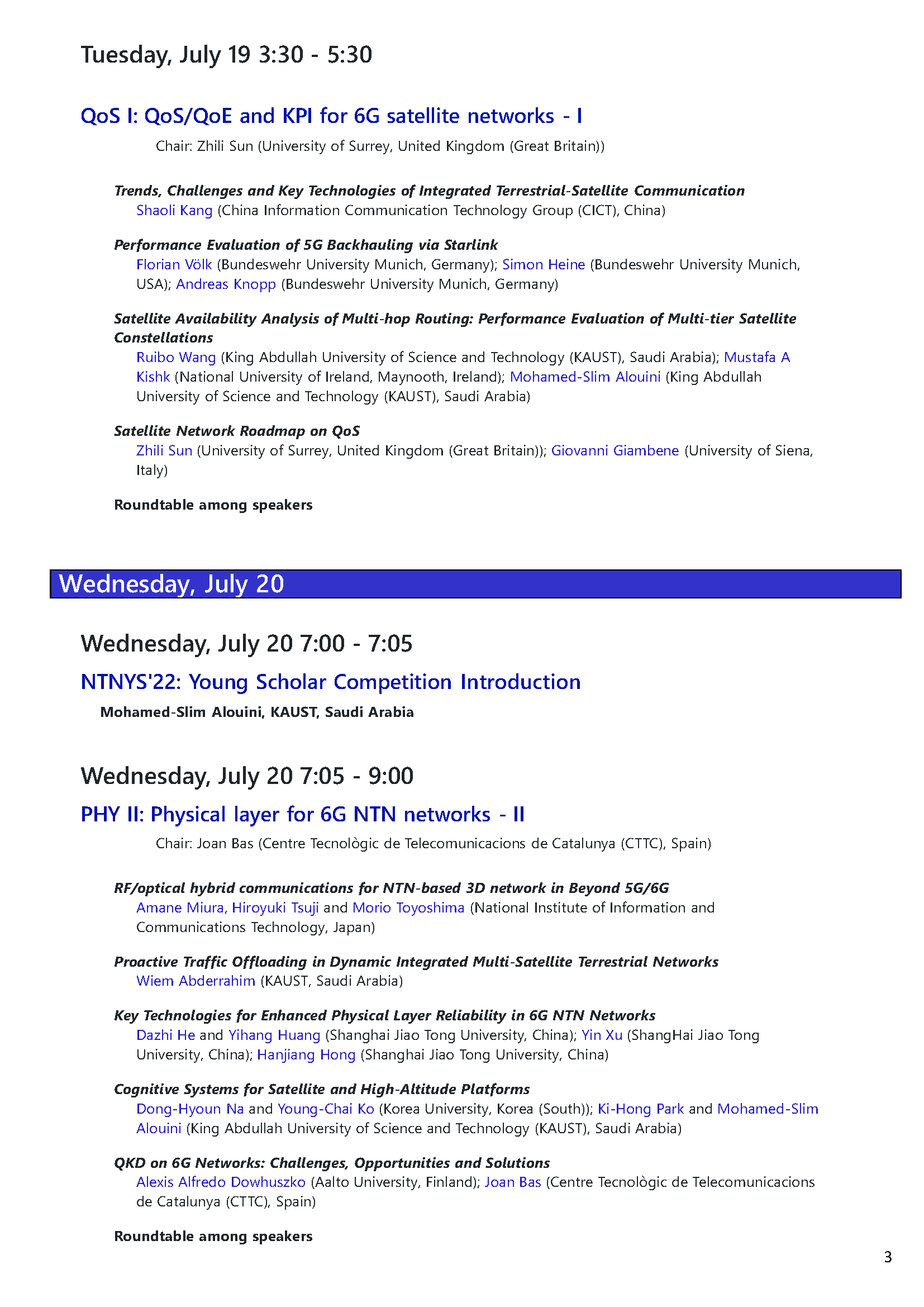 |
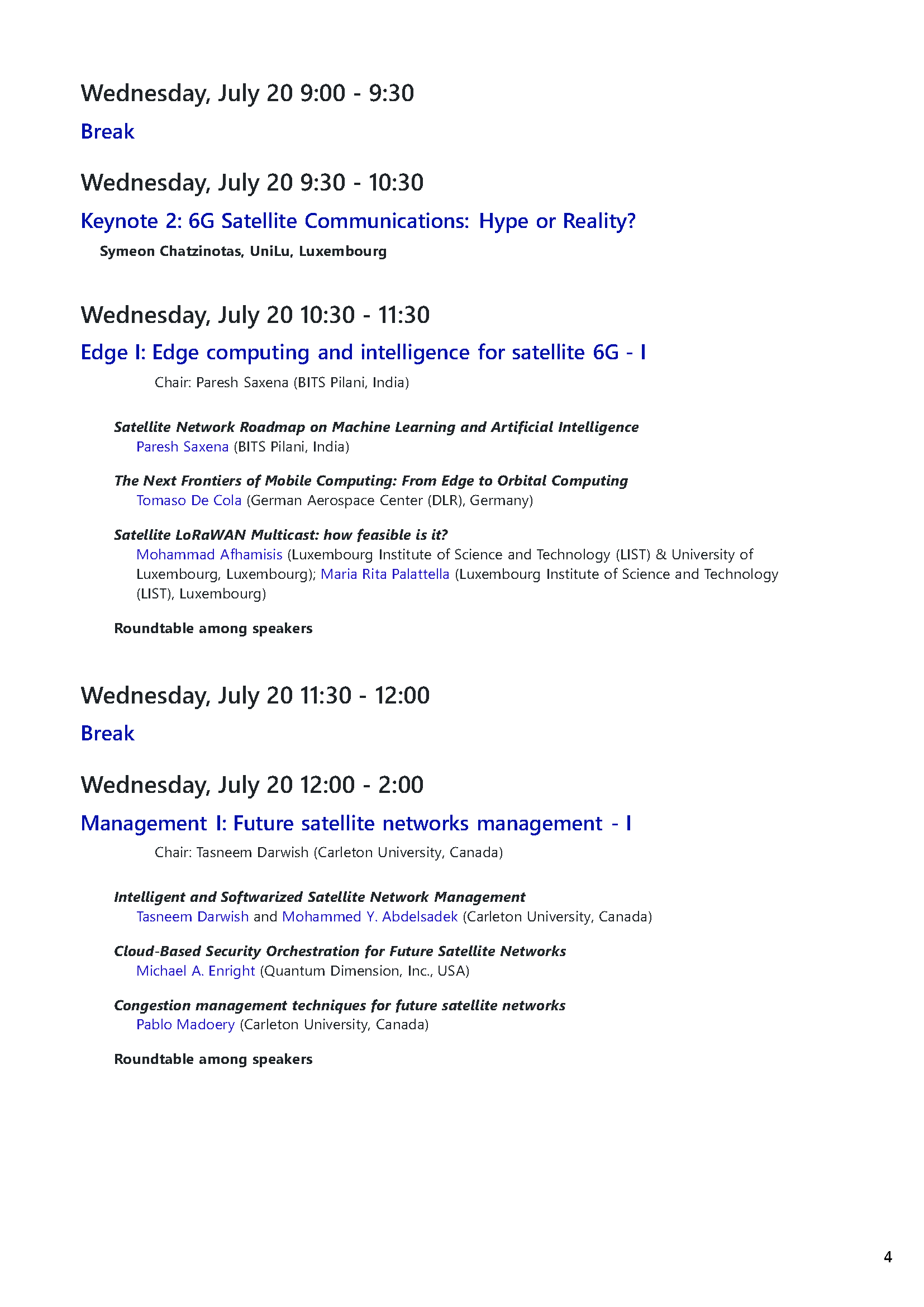 |
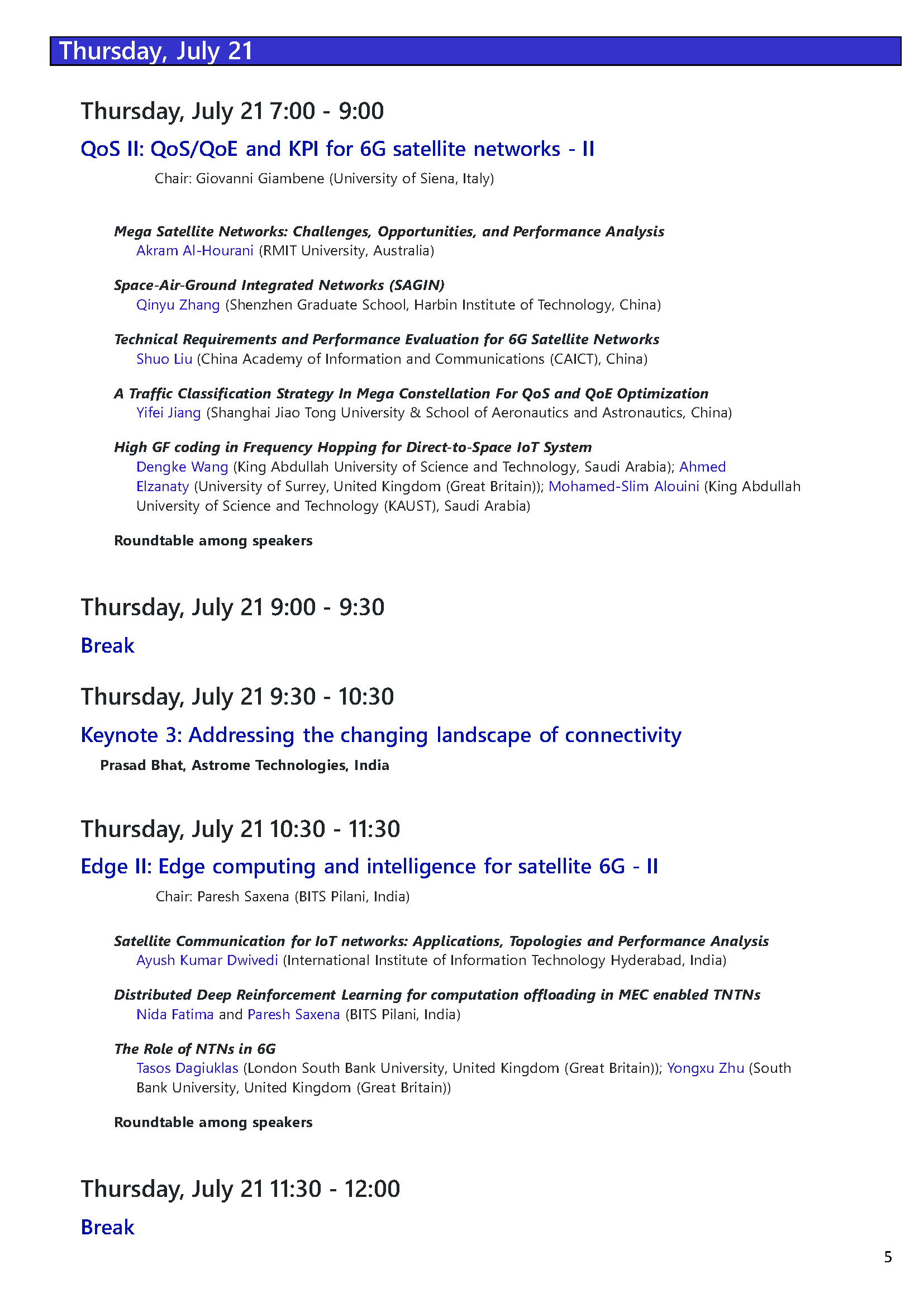 |
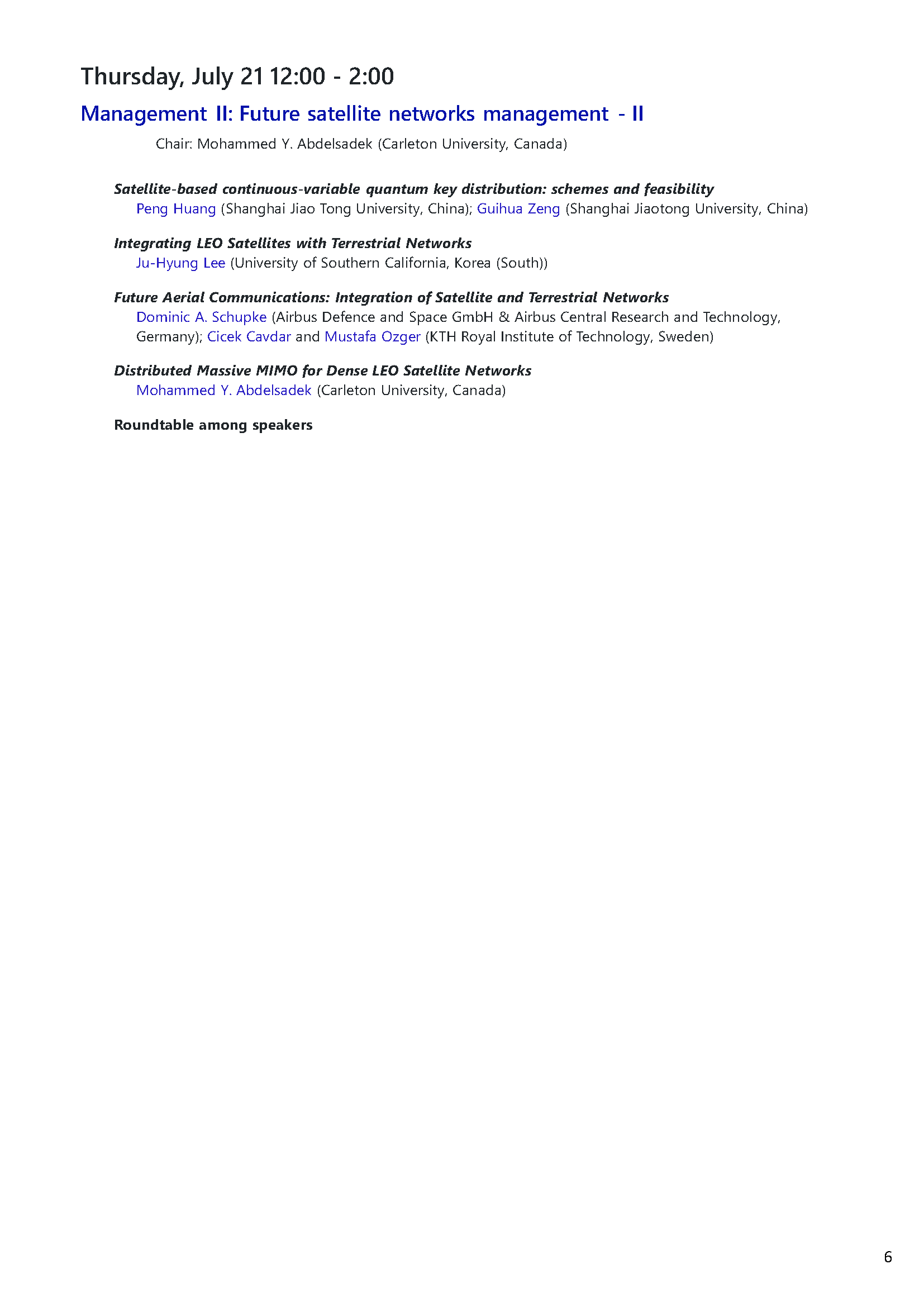 |
Keynotes
19 July at 12:00pm ET US (18:00 CEST)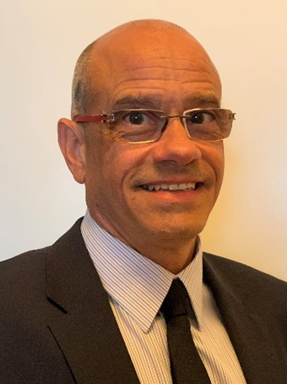 Title: “Vision and Requirements for Satellite Radio Interface(s) of IMT-2020”
Title: “Vision and Requirements for Satellite Radio Interface(s) of IMT-2020”
Keynote speaker: Nelson Malaguti, ITU
Abstract:
As defined in Resolution ITU-R 56-2, International Mobile Telecommunications-2020 (IMT-2020) systems are mobile systems that include new radio interface(s) which support the new capabilities of systems beyond IMT-2000 and IMT-Advanced.
The satellite access as one of the radio access technologies of IMT-2020 will contribute to support mobility through integration at the terminal, network and service level, as well as other use cases. Satellite network components are envisioned to provide worldwide ubiquitous coverage to end user equipment to meet the usage scenarios defined for the satellite component of IMT-2020.
The use and objective of satellite radio interfaces is expected to be complementary to terrestrial IMT-2020 operations, given satellites’ unique ability to address coverage challenges and complex use-cases. Certain aspects of IMT-2020 are not expected to be served by the satellite radio interface for IMT-2020, for example very high data throughputs of eMBB, very high connection density of mMTC and low latency for URLLC, given the inherent distance of satellites to associated earth terminals or earth stations and the challenge of resulting greater latency compared to terrestrial operations. Therefore, the capabilities developed previously should be considered for the development of satellite radio interface(s) of IMT 2020, while the requirements have been modified considering specific satellite characteristics, such as throughput and user data rates. This is reflected through the definition of eMBB-s, mMTC-s and HRC-s usage scenarios for the satellite component of IMT-2020.
Biography:
Nelson Malaguti is Counsellor at the Radiocommunication Bureau (BR) of the International Telecommunication Union (ITU). He is responsible since June 2006 for ITU-R Study Group 4 on Satellite Services (FSS, BSS, MSS and RDSS) and the Coordination Committee for Vocabulary. Before taking up his current duties, he worked at EMBRATEL in Brazil, involved in the coordination, notification and registration processes for the Brazilian satellite networks. He received the M.Sc degree in telecommunications engineering from PUC-RIO, Brazil. He then worked in the Space Services Department of the BR ITU, having participated actively at World Radiocommunication Conferences (WRC) such as WRC-97, WRC-2000 and WRC-03. He also participated actively at WRC-07, WRC-12, WRC-15 and WRC-19, and is currently actively involved in the preparations for WRC-23.
20 July at 9:30am ET US (15:30 CEST)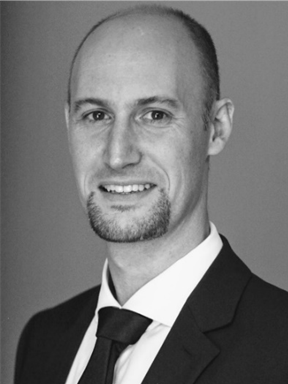 Title: “6G Satellite Communications: Hype or Reality?”
Title: “6G Satellite Communications: Hype or Reality?”
Keynote speaker: Symeon Chatzinotas, University of Luxembourg, Luxembourg
Abstract:
This talk will address the latest advances in 6G Satellite Communications in promising scenarios, such as multi-layered networks, integrated satellite-terrestrial systems, satellite IoT and space edge processing. Specific attention will be given to distributed processing techniques, AI for/in space and beyond Earth communication systems. The talk will conclude with a summary of the most pressing open challenges.
Biography:
Symeon Chatzinotas (MEng, MSc, PhD, SMIEEE) is currently Full Professor / Chief Scientist I and Head of the research group SIGCOM in the Interdisciplinary Centre for Security, Reliability and Trust, University of Luxembourg. In the past, he has lectured as Visiting Professor at the University of Parma, Italy and contributed in numerous R&D projects for the Institute of Informatics & Telecommunications, National Center for Scientific Research “Demokritos,” the Institute of Telematics and Informatics, Center of Research and Technology Hellas and Mobile Communications Research Group, Center of Communication Systems Research, University of Surrey. He has received the M.Eng. in Telecommunications from Aristotle University of Thessaloniki, Greece and the M.Sc. and Ph.D. in Electronic Engineering from University of Surrey, UK in 2003, 2006 and 2009 respectively. He has authored more than 450 technical papers in refereed international journals, conferences and scientific books and has received numerous awards. He is currently in the editorial board of the IEEE Transactions on Communications, IEEE Open Journal of Vehicular Technology and the International Journal of Satellite Communications and Networking.
21 July at 9:30am ET US (15:30 CEST)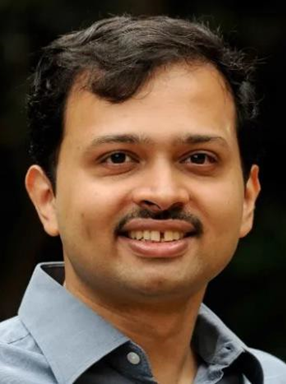 Title: “Addressing the Changing Landscape of Connectivity”
Title: “Addressing the Changing Landscape of Connectivity”
Keynote speaker: Prasad Bhat, Astrome Technologies, India
Abstract:
It is common knowledge that demand for bandwidth is growing crazily with smartphones, wearables, VR (Metaverse), etc. But what about the supply of bandwidth? 4G? 5G? 6G? The supply of bandwidth is not an easy problem to solve and requires a multitude of approaches to reach different types of consumers. Till 4G, the focus was only about just raw bandwidth distribution. But beyond that, identification of the diversity in consumers is being attempted to be addressed. The increase in bandwidth requires newer mechanisms to transport it from the core network to distribution/access points. Also, latency requirement is going the exact inverse where lower and lower latency being asked for enabling new applications. This talk will portray the above aspects in detail. At Astrome, transport oriented high bandwidth products and solutions have been and are being developed to deliver capacity via terrestrial and space pathways. The same will be elaborated in the context of changing needs of consumers.
Biography:
Prasad is the co-founder, Chairman and CTO of Astrome, a deeptech startup developing wireless high-bandwidth products for 5G and SatCom. Before Astrome, Prasad co-founded another successful company in the domain of visual search and AI. He did his master’s in System Science and Automation Engineering and PhD in Computer Science and Automation Engineering at the Indian Institute of Science. Prasad did his bachelor’s in electrical engineering from National Institute of Technology, Surathkal. He received the best outgoing student award during his master’s at IISc. Prasad has been an architect for various technologies including a nanosatellite, a visual search engine at Streamoid (http://streamoid.com), a stochastic game theory solver, the software tool for the 3D measurement Texas Instruments chipset (https://github.com/3dtof/voxelsdk). Prasad has also published a popular book on Stochastic Theory with Springer (https://doi.org/10.1007/978-1-4471-4285-0).
Important dates
Submission deadline to submit a two-page description of your presentation: 16 June 2022
Review Notification: 6 July 2022
Final version of the presentation to be submitted by: 12 July 2022
Download the presentation template here.
Organizing Committee
Mohammed Abdelsadek, Carleton University, Canada
Mohamed-Slim Alouini, King Abdullah University of Science and Technology (KAUST), Kingdom of Saudi Arabia
Joan Bas, CTTC, Spain
Ayush Dwivedi, International Institute of Information Technology Hyderabad, India
Tasneem Darwish, Carleton University, Canada
Giovanni Giambene, University of Siena, Italy
Sastri Kota, University of Oulu, Finland
B. S. Manoj, Indian Institute of Space Science and Technology, India
Paresh Saxena, BITS Pilani, Hyderabad Campus, India
Zhili Sun, University of Surrey, UK
Kanglian Zhao, Nanjing University, China
Debabrata Dalai, Indian Institute of Space Science and Technology, India
Sarath Babu, Iowa State University, Ames, USA
Ashutosh Dutta, JHU/APL, USA

